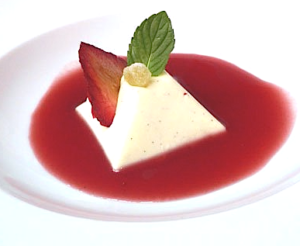all about. Showing your love for someone through a carefully orchestrated
meal–hopefully one that is memorable for years to come; and as Samia tells
it, this man plays his part perfectly.
 Many years ago, when I was a single, carefree lass, I used to hang out with a lovely Moroccan princess. Well, the lovely princess, who I will call Samira, was involved with a young, vibrant Russian fellow who fell in love with her. He invited both of us to a lamb with artichoke heart dinner. He was trying to impress her with his culinary talents, and I was definitely the third wheel that night. I remember thinking he must have put a lot of energy into choosing what to prepare for this woman. I thought it was adorable that he decided on artichoke hearts as a way to symbolize his wish to give her his heart. The gesture was sweet and romantic, but the story ends sadly. Samira went back to Morocco without him, because her family refused to accept their relationship. I still remember that candlelit dinner, at which I played the part of the observer who saw real love in his eyes for my dear friend. My love, however, was for his marinated artichoke hearts, and that’s what this column is all about.
Many years ago, when I was a single, carefree lass, I used to hang out with a lovely Moroccan princess. Well, the lovely princess, who I will call Samira, was involved with a young, vibrant Russian fellow who fell in love with her. He invited both of us to a lamb with artichoke heart dinner. He was trying to impress her with his culinary talents, and I was definitely the third wheel that night. I remember thinking he must have put a lot of energy into choosing what to prepare for this woman. I thought it was adorable that he decided on artichoke hearts as a way to symbolize his wish to give her his heart. The gesture was sweet and romantic, but the story ends sadly. Samira went back to Morocco without him, because her family refused to accept their relationship. I still remember that candlelit dinner, at which I played the part of the observer who saw real love in his eyes for my dear friend. My love, however, was for his marinated artichoke hearts, and that’s what this column is all about.
Now that’s a Seduction Meal, don’t you aree?
During the Middle Ages there was hardly a mention of artichokes in the literature of the time, though they were enjoyed at Sicilian tables. This same period saw Saracens growing them in Granada while the Moors were cultivating them in North Africa. In Turkey, artichoke extract was used as a blood cleanser and for detoxification of the liver. The Turks believed the artichoke was an ideal treatment for hepatitis.
The Italians love artichokes and use them in many different ways, from stuffed to fried in olive oil. The Italians grow several varieties of artichokes, such as Catanese and Violetto di Toscana. New Orleans’s French Quarter is famous for stuffing artichokes with seafood, breadcrumbs, garlic, onions, cheese, and lemon peel. (My taste-tester recently sampled authentic New Orleans stuffed artichokes at this year’s New Orleans Jazz and Heritage Festival, and she thought they were just dandy!)
Nutritionally speaking, artichokes are mini-packets of vitamins, minerals, and phytochemicals. It is understandable with the ongoing research that past generations considered the artichoke an appetite stimulant. A medium-size artichoke offers 6 grams of fiber with only 60 calories, and 400 grams of canned artichoke hearts has only 105 calories. The artichoke has no fat or cholesterol and many vitamins and minerals, to include potassium, magnesium, manganese, phosphorus, iron, and calcium. It also contains 212 IU vitamin A, 1.20mg niacin and .13 mg vitamin B6. It even offers some folic acid and vitamin C. Because the artichoke is high in nutrients and phytochemicals, it is wise to eat artichokes regularly to prevent some types of heart disease and cancer.
A note for wine-lovers: artichokes contain the phytochemical cynarin, which affects the taste buds in such a way that wine becomes unpalatable.
I have one last interesting nutrition note about artichokes for you. According to Rafe, et al., as reported in Phytomedicine: International Journal of Phytotherapy & Phytopharmacology (September 2008, page 668), artichoke leaf extracts reduce plasma cholesterol in normal healthy hypercholesterolemia adults. Rafe, et al., asserted that cardiovascular diseases are the major causes of death in the United Kingdom and are linked to high circulating levels of cholesterol in the blood. It has been reported that artichoke leaf extracts reduce plasma lipids levels. The researchers also report that artichoke leaves have been used in Europe to improve digestive and urinary tract health. In fact, artichoke leaf extracts are used as a remedy for indigestion in Germany and Switzerland.
Artichokes can be stuffed, fried, braised, steamed, and incorporated into many different dishes. Fresh artichokes, although difficult to prepare, are worth the trouble, but if you can’t find them, canned will suffice. This recipe calls for canned artichokes because of the lack of fresh ones in Korea.
Marinated artichokes
1 can (400 grams) artichoke hearts in water
Dressing
- 2 Tablespoons balsamic vinegar
- 1 Tablespoon garlic, chopped
- 1/4 cup olive oil
- 1 Tablespoon fresh lemon juice
- 2 teaspoons red pepper or red-hot Korean pepper flakes
In a bowl, combine all dressing ingredients. Empty artichoke hearts into a bowl, and remove water. Add dressing to artichokes and let stand for a few hours or overnight. Serve as an appetizer or side dish.
Story by Samia Mounts


